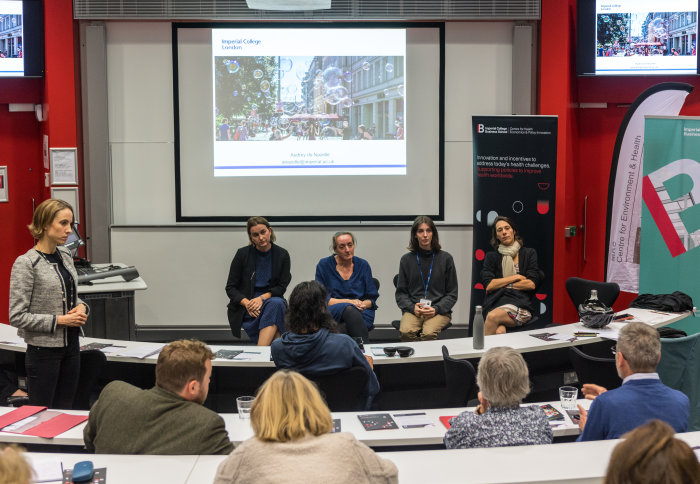
Experts discuss air pollution in London's open spaces with the public

An interactive map which allows people to check average air pollution levels in their local green spaces has been launched by Imperial researchers.
The online map allows people living in London to find information about the average level of nitrogen dioxide (NO2) in their local parks and playgrounds. Created using air quality data from the London Atmospheric Emissions Inventory and Ordnance Survey open space geographic data, the map allows people to zoom in on different green areas within the capital and see the average levels of NO2 in that location. Areas that breach international guideline levels of pollution are coloured in red.
The map was launched as part of a collaboration between Imperial’s School of Public Health and the Business School with the University of Leicester.
The map was showcased alongside new research that shows more than one quarter of London’s parks, playgrounds, and open spaces exceed international safety limits for air quality, potentially putting thousands of children and vulnerable Londoners at risk.
The public gathered at an evening event at the Business School to hear more about the findings of the research and ask questions to a panel of experts.
Adopting new lifestyle habits
Dr Audrey de Nazelle, Senior Lecturer at Imperial’s Centre for Environmental Policy, set out how people can help reduce their contribution to air pollution through what she describes as the RAPS framework – reduce, avoid, protect and support to tackle air pollution. She said: “Most of the pollution in big cities is caused by traffic, so what can we do to tackle this problem? We can get out of our cars and start walking, cycling or taking public transport to school or work.”
“A quarter of four and five year olds in the UK are overweight, so getting children to walk or take a scooter to school has many long-term health benefits." Dr Audrey de Nazelle Senior Lecturer, Centre for Environmental Policy
According to Dr de Nazelle, many parents prefer to drive their children to school rather than encourage them to walk or travel on public transport because of the safety risks associated with living in a big city. However, she argued that parents should consider re-thinking their approach, given that the school run accounts for 25 percent of traffic on the roads in London during the rush hour. Emphasising the long-term health benefits of children walking to school she said: “A quarter of four and five year olds in the UK are overweight, so getting children to walk or take a scooter to school has many long-term health benefits.”
Avoiding exposure to air pollution was another of Dr de Nazelle’s recommendations for encouraging people to adopt better lifestyle habits. She advised people to avoid main roads during busy times and consider walking or cycling through side streets or parks to reach their destination. People can also help protect themselves against the health impact of air pollution by making healthy lifestyle choices such as eating a more balanced diet, becoming more active and getting enough sleep.
Dr de Nazelle encouraged people to get more involved in supporting local air pollution campaigns in their area. “Talk to your neighbours about the issues and encourage more people to start walking or cycling. You can also join the Clean Air Parents Network or write to your local council to help motivate politicians into taking action on this important issue.”
Catherine Maguire, Clean Air Community Campaign Coordinator for ClientEarth and one of the panellists at the event said: “Air pollution affects us all, but this research highlights that the poorest children bear the brunt of the burden, while at the same time contributing the least to the problem. Some positive steps have been made in the capital but the Mayor and UK Government must go further and deliver an Ultra Low Emission Zone that protects the whole of Greater London as well as practical support for people and businesses to move to cleaner forms of transport.”
Ben Paul, a member of the Clean Air Parents’ Network in Camden, said: “I go to the park with my children every day after school. I used to see parks as the ‘lungs of London’, a place to be in nature and escape air pollution in the city. This new research is upsetting because it highlights generations of disregard for our own environment. Children shouldn’t have to pay with their health to live in a city. Those in charge must take bold and quick action to protect children across London.”
The event was part of a series of events on clean air organised by Imperial College London's Air Quality Network and the Centre for Health Economics and Policy Innovation. It was supported by Clean Air Parents’ Network, ClientEarth and the British Lung Foundation.
Supporters

Article text (excluding photos or graphics) © Imperial College London.
Photos and graphics subject to third party copyright used with permission or © Imperial College London.
Reporter
Laura Singleton
Communications Division



